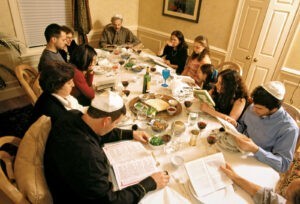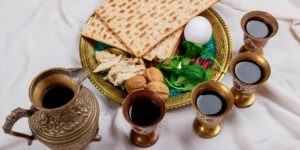What is Passover?
Passover explained? The word Pesach is a Hebrew word that means “Pass-over”. The word holds its origin in a Biblical story about the Exodus from Egypt. It signifies the passing over of the sufferings of Hebrews; towards a better life, in a state of freedom. In great contrast to the prior enslavement of the Hebrews in Egypt. Thus, Passover is a major Jewish holiday that lasts seven to eight days, differing in length for Jews living inside or outside of the Land of Israel.
Passover is considered to be the festival of freedom for the Jewish people. This national holiday, for the Jewish people, is celebrated with great enthusiasm and devotion to their cultural heritage. Greetings and meetings with family and friends and community members make Passover a prominent and much-loved Jewish holiday.
In addition to special prayer services and grand meals, Jewish people abstain from eating bread and any leavened food item for the entire Passover holiday. Every Jewish person has their own way to derive pleasure and peace out of ‘these gateways Pesach days’.
There are two main major dinner events, known as Seders, on Passover. There is also a concluding communal meal, at the synagogue or shul, which is celebrated on the eighth day or final day. Immediately following Passover, there is a celebration known as a Mimouna, which is usually celebrated by Sephardic Jews.
A Mimouna is a special event for indulgence in leavened foods, special desserts, and sweet drinks. As well, during a Mimouna Jewish people will rejoice with family and friends, and community members. There is also singing and music at a Mimouna feat. Passover and a Mimouna are Jewish heritage events showcasing: freedom, joy, and delight in a rich Jewish cultural heritage.

When is Passover?
The Passover dates are celebrated in accordance with the dates, derived from the Torah, which states when Passover is to be celebrated, on the Hebrew Calendar. The Hebrew Calendar and the months, within it, are believed to be directly synchronized, with the lunar cycle, or phases of the moon.
On the 15th day, of the Hebrew month of Nissan is always a full moon night. The month of Nissan is also known as the month of Springtime. Thus, the 15th day of the Hebrew month of Nissan is considered to be the beginning of the Passover period.
Passover is celebrated for seven days, in the Land of Israel and for eight days in the Diaspora (outside of the Land of Israel).
When is Passover this year?
When is Passover 2021? The Passover Holiday of 2021 was celebrated from March 27 to April 4. The first Seder (community ritual dinner) took place on March 27, after nightfall, followed by the second Seder on March 28. Consequently, in the year 2022, the Passover Holiday is expected to begin on the evening of the 15th day of April, with the first gateways Pesach Seder meal.
Origin of Passover
Passover is believed to be the most auspicious time of the Jewish calendar year, since it marks the redemption of the Hebrews from Egyptian bondage, under the Egyptian ruler Pharoah.
The Hebrews experienced more than 200 years of slavery and suffering, under Egyptian rule, by various Pharaohs. Almighty God redeemed the Hebrews, by sending messages and miracles through Moses to Pharoah, in Eqypt.
Initially, Pharoah was impressed by the miracles and was willing to let the Hebrews go free from the Land of Egypt. But immediately following his approval to let the Hebrews go free, Pharaohs refused to send out the Hebrews from Egypt, at least ten times.
As a result, of Pharoah’s recanting of his permission to let the Hebrews leave Egypt, one devastating plague after another began to destroy Egypt, through the decimation of crops, livestock, and eventually with the death of the firstborn son’s of the Egyptian people.
Precisely, on the 15th day of the Hebrew month of Nissan, in 1313 BCE, the last of the ten plagues resulted in the death of the firstborn son’s of the Egyptian’s. Conversely, the firstborn sons of the Hebrews were completed spared from death, by the Lord, in Egypt.
Following the plague of the firstborn, approximately, six hundred thousand Hebrew men, between 20 and 50 years of age; along with their wives and children left Egypt quickly. The Hebrews trekked through the Red Sea, across the Sinai desert, to Mount Sinai where they received the Ten Commandments.
Since the redemption of the Hebrews from Egypt; Passover has been celebrated, as the season of freedom for the Jewish people. It marks the end of slavery and bondage for the Jewish people. It commemorates a cycle of renewal and begins a cycle of celebration, with great rejoicing.

Greetings for Passover Celebration
Though there is no required way for Jews to greet one another for Passover vacations, there has always been a popular traditional greeting for Jewish Passover, “Hag Sameach”, “Happy Holiday”. Generally, Jewish people greet one another by saying: “Happy Passover”, but there there are some more personalized ways to greet loved ones.
We can always say “Kosher and joyous Passover” if we know that person keeps a kosher home for Passover. Passover derives its original name from Pesach, therefore, it is always good to say “Happy Pesach” when greeting another Jew on Passover.
Prominent Passover Pesach Practices
The significance of Passover lies in its main ritual activity, which is known as the Seder. The first two nights (only the first night in Israel) of the holiday include a festive family or communal meal. During the Passover Seder, there is a recounting of the Passover story, which is read from a Haggadah (ordered and codified religious text booklet).
The Passover story is ‘brought to life through narration, by patrons of a Seder, each one taking a turn to read at the Seder table. The narrators of the Passover story read from the Haggadah, which contains Biblical stories, poems, songs and blessings.
The main part of the Pesach Program Seder is the eating of the Passover getaway meal, as proscribed by the Haggadah. Recitation of the Haggadah is of utmost importance, during the Pesach Program Seder.
Throughout the Passover Holiday, Jewish people are commanded, by the Torah to eat only food that does not contain any chametz (leavened bread) and to avoid foods made with leavened dough.
Immediately following the first day of Passover, there begins a 49-day long period, which is known as the Omer. This commemorative time period is a count down, or rather a count upwards, to the Jewish holiday of Shavuot, which commemorates the giving of the Ten Commandments to the Jewish people, at Mount Sinai.
The Omer count signifies the offerings that were brought to the Holy Temple in Jerusalem. The Omer commemorates the measurement of barely, brought as an offering to the Temple in Jerusalem, during the time period between Passover and Shavuot, which is seven complete weeks and one day.
Passover Celebratory Foods
The Passover Festival is celebrated with savory meals, with the absence of leavened food. Thus, Matzah (unleavened bread) and Maror (bitter herbs) are the most prominent food items, which are served during the Passover Seder meals. Matzah is eaten for the entire week of Passover.
Also, served during the Passover getaways Seder meal is haroset, which is a mixture of nuts, fruits, wine, and cinnamon.

In recent times, other delicious food items have made it to the Passover recipe list. These include roasted chicken, potato kugel, sweet potatoes, beef brisket, and matzoh ball soup; among other traditional Passover foods.
Most of the listed Passover feast food items do not require much cooking or baking time. This is symbolic of the haste, with which the Hebrews (while being slaves) left Egypt. They had no time for their dough to rise. Thus, while consuming these scrumptious cultural meals, celebrants provide deep honor to all the Hebrews that were redeemed from slavery, in Egypt.
Moreover, apart from specific Passover feast foods, wine holds the greatest significance for the Passover Holiday. The Torah and the Haggadah instruct us that four glasses of wine or grape juice must be consumed by each Jewish person, during the Passover Seder meal.
Each cup of wine holds special significance. The first glass is meant to represent salvation from harsh labor during Egyptian bondage. The second cup denotes the remarkable day when the Hebrews left Egypt. Followed by the third cup of wine, which represents the partying of the Red Sea.
The fourth glass of wine symbolizes the remarkable achievement of the Hebrews, in becoming a nation, with the Divine revelation, at Mount Sinai.
How To Celebrate Passover Vacations 2021?
The annual celebration of Passover festival is spent differently, by each family and by many people. Some people choose to travel on Passover getaways for the Passover Holiday.
There are various Passover vacation providers and many great options for Passover vacations. Some Passover vacation packages offer excursions, in addition to the main onsite Passover program event activities.
Pesach and Passover vacations are a great way to spend time with family and friends, during Passover, in a fun and exciting environment, at a Kosher hotel or Kosher resort.
To find the best options for Pesach getaways and Passover vacations, kindly review the great Passover vacations and Passover programs proudly showcased on Vacations Passover.
We provide top listings of fully inclusive vacation packages, to make your Passover vacation memorable. Vacations Passover is an optimal place to find a superb Passover vacation for you and your family for this upcoming Passover Holiday in 2021 & 2021.
Please find, review, source of grand getaways Passover, and choose your Passover Vacations Destination package on VacationsPassover.com.
If you are looking for the Best Passover vacations provider, then Vacations Passover is the one for you.! Enjoy your Passover vacation trips with us.
